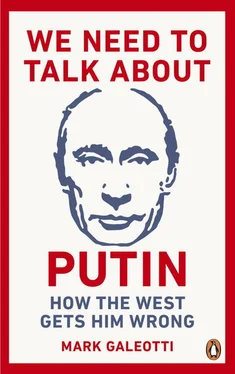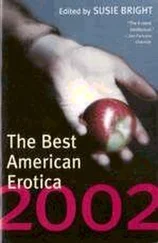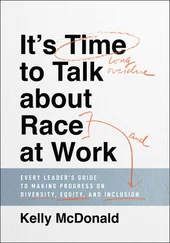They lost interest. It is striking how far Putin’s foreign ambitions are psychological, about the ideas of power and forms of respect. He certainly seems to believe that the West is trying to keep Russia under its thumb. In 2011 he said, ‘Sometimes it seems to me that America does not need allies, it needs vassals.’ The trouble is that, when viewed from the Kremlin’s narrow windows, and especially when filtered through the conspiracy-theory-laden analyses often peddled by those in Putin’s circle, the world can seem very hostile. Uprisings in the Middle East and other post-Soviet states? Clearly not protests against corrupt, inefficient and unresponsive rulers, but CIA plots to bring down Moscow-friendly regimes. The rise of a new generation of young, middle-class Russians unimpressed with what Putin can offer and willing to protest? Obviously another example of creeping and weaponised Westernisation. After all, as far as Putin is concerned, the decline of Russia’s distinctive cultural values and civilisational uniqueness also affects its place in the world, because ‘without history, without culture, without mentality, nothing works. Those are the things that glue everything together. All those things create a country, ensure its cohesion and determine its position in the international arena.’
This sense of military, political, economic and cultural vulnerability is widely held, and there are those who see it in even starker terms than Putin. When, for example, Nikolai Patrushev, secretary of his Security Council, one of his closest allies and the nearest thing he has to a national security adviser, openly affirms that he knows for a fact that the USA ‘would very much like Russia not to exist at all as a country’, what can one expect? The claims of my colonel friend that the West is just waiting for the chance to invade Russia are not just the whinnies of an old warhorse, they reflect a genuine concern that, however much we may think it perverse and paranoid, continues to inform Moscow’s military planning and policy discussions.
Losing an empire, and with it great-power status, is hard – one could say that Britain and France haven’t really come to terms with this, fifty-plus years on. Putin doesn’t simply want to turn the clock back to past glory days, whether tsarist or Soviet. Instead, he is kicking against Russia’s new place in the world. After all, this is a country with a shrinking population and an economy the size of Spain’s, that is largely dependent on oil and gas. Despite having innovative and creative programmers and designers, it is having trouble adapting to the information age. It has nuclear weapons and a large army, but it can barely afford either, with a third of the federal budget being spent on security, broadly defined. It also has strikingly little ‘soft power’ – there are wannabe strongmen who dream of being like Putin, but not many countries want to be like Russia. On any objective basis, Russia is not a great power. But Putin is determined that Russia matters, matters more than this recitation of moderate strengths and less moderate weaknesses would suggest.
At the same time, Putin – who is known to read a lot of history – has a view of what being a great power in the world means that is more rooted in the nineteenth century than the twenty-first: he thinks each great power has a sphere of influence, buffer states and jewels in the crown. For example, when Putin punished Ukraine and Georgia for their temerity in trying to get closer to the West, it was less for practical reasons and more because he could not bear to see them being ‘lost’. Secondly, he sees a great power as having a voice in all global issues of consequence, not because it necessarily has interests at stake but rather because this symbolises its status. Finally, he thinks a great power should get to waive the rules and should not have to consider itself bound by international laws and norms.
This is a pipe dream, especially for a country that is only a great power in its own imagination, but in many ways this is the point: politics and power are all about perception. By acting as if Russia is a great power, Putin hopes to persuade everyone else either that this is true, or at least that it is not worth trying to challenge the idea and that they should stop trying to ‘keep Russia down’. At 1.7 metres tall, Putin is of below average height, but with his over-the-top tough-guy persona, he tries to project a rather more formidable image. As I will discuss in Chapter 6, his persona is precisely that, a piece of purposeful theatricality, and the same is true of much of his foreign policy. He is trying to get us to show respect, to treat Russia as if it still matters in the world, as if it were much more than 1.7 metres tall. In the name of this defensive policy, he is undoubtedly deploying aggressive tactics, but this is not the start of a Soviet revival, nor yet a tsarist one – it is an angry, despairing scream into the void, a last attempt to deny history, to pretend the age of Russian superpower is not over.
Chapter 4: Putin Sees Money as a Means, Not an End
According to Bill Browder, an American-born entrepreneur who made a lot of money in Russia before falling foul of the wrong people and losing a lot of it too, Putin’s total net worth is around $200 billion (£156 billion), which makes him as rich as Jeff Bezos of Amazon and Bill Gates of Microsoft put together. Is Putin truly the world’s richest man? The people who will know are not the kind of people who will talk to me, but this is a question I have asked all sorts, from Western intelligence analysts to Russian journalists. Perhaps the best answer I ever got was from a former tax policeman who was then working in a pretty senior role at Rosfinmonitoring, Russia’s Federal Financial Monitoring Service. At first he looked pained at the usual question from a dumb foreigner, but then he burst out laughing: ‘Listen, you don’t understand. It’s not the 1990s. Putin doesn’t go looking for money – money goes looking for him. He probably doesn’t know how much and where it is – why should he? He’s just…’ He was clearly casting around for a suitable metaphor. ‘Swimming in it,’ he concluded with a smile.
Putin is undeniably rich, and far richer than he admits. Ahead of the 2018 elections, he issued a statement of his assets which said he had earned 38.5 million rubles (£458,000) over the previous six years from his salary, savings and pension, and had some £190,000 in the bank. He also owns a 75-square-metre flat in St Petersburg, two Soviet-era vintage GAZ cars and a little Lada Niva 4x4. His palaces, private jets and so forth can be hand-waved away as perks of the job rather than his own property, but he has, at the same time, been seen sporting a collection of high-end watches that has together been valued at half a million pounds. An old Georgian curse ran, ‘May you live on your wages alone.’ It is hard to believe that this applies to Vladimir, any more than to the rest of the Russian elite. They routinely turn out to have massive mansions, such as Defence Minister Sergei Shoigu’s £14 million pagoda-themed estate and presidential spokesman Dmitry Peskov’s £5.5 million home. Chechen strongman Ramzan Kadyrov, with characteristic overkill, also has a private zoo with a tiger and an £840,000 Lamborghini Reventón.
So is Putin little more than the ‘embezzler-in-chief’, the godfather of a state-sized mafia? This certainly seemed to be to be the message of the so-called ‘Panama Papers’ leak in 2015, when millions of files from a Panamanian law firm that specialised in representing the obscenely wealthy were revealed. Among many other personal and corporate financial shenanigans, they appeared to show that Putin had stashed away as much as £1.5 billion in various opaque offshore companies and in the accounts of sundry of his cronies, including at least £80 million in the name of his close childhood friend, the cellist Sergei Roldugin.
Читать дальше












